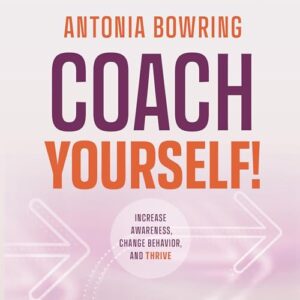Navigating Neurodiversity: Empowering Leaders with ADHD
By Antonia Bowring’ Author of Coach Yourself! Become the Best Version of Yourself Using Practical Frameworks.
Receiving an ADHD diagnosis when I was nearly 50 years old refocused my executive coaching
toward supporting leaders with ADHD, whether they were diagnosed or self-identified. My
personal experience allows me to connect with their journeys, using my insights, training and
coaching skills.
My aspiration? To normalize ADHD. Our brains are wired differently. It’s that simple and that
complex! If we accept this fact, we can incorporate that recognition into expectations and
accountability at work, home and play. We often discuss ADHD superpowers — energy,
creativity, empathy and hyperfocus — while acknowledging undeniable challenges. I believe we
should accept ADHD’s gifts and challenges together, as a unified whole. This philosophy steers
my coaching work with my ADHD clients.
In my executive coaching sessions with ADHD clients, I lean on two core frameworks: “4
Concepts to Get Started” and the “Profound & Practical Spectrum.”
4 Concepts to Get Started
As a coach, I underscore these four concepts for those grappling with their ADHD diagnosis.
While the concepts aren’t necessarily sequential, they organically intertwine and lay a solid
groundwork for thriving with ADHD.
● Recognition: How do I spot my ADHD symptoms?
● Acceptance: What does embracing my ADHD entail?
● Education: How can I better comprehend ADHD?
● Integration: How do I incorporate ADHD into my life seamlessly?
Recognition. The first step is to acknowledge your ADHD symptoms, whether you hold an
official diagnosis or not. Symptoms might involve wrestling with prioritization, focus, and erratic
emotions. I’m not dictating a formal diagnosis, but many find clarity in doing so. And once ADHD
is recognized, many people find that behaviors from the past suddenly make more sense.
Acceptance. Accepting your ADHD can be a gradual process. Some fear it will become an
excuse, but I encourage considering it akin to using glasses for poor eyesight. We aim to
structure support to manage downsides and accentuate the upsides. For instance, one client
feared attributing lateness to ADHD would seem like an excuse. But by accepting her ADHD,
we devised strategies – like multiple alarms and meeting buffers – to help address it.
I also encourage clients to embrace support, whether from friends, family, or ADHD-focused
groups. Remember, there’s no shame – you’re neurodiverse. That’s who you are and you
deserve support.
Education. Post-diagnosis, many rush to the internet. The good news is that resources are
plentiful, but beware of getting overloaded. Take it slow. Begin with a reliable source like
Additudemag. Podcasts like “I Have ADHD” and “Faster Than Normal” also offer valuable
insights. This is a marathon, not a sprint.
If considering medication, consult a medical professional. Educate yourself on the pros and
cons of this decision. And remember, your choices can evolve. You might try other supports
rather than medication at first, and change your mind later. Those with ADHD should be open
to reviewing and changing their ADHD strategies over time as work and life circumstances shift.
Integration. Integrating ADHD into your life is a personal journey about self-knowledge, and
there is no one way to be successful. Everyone needs to find their own path. The key is knowing
that there is a unique path out there for you.
Your responses to questions such as these will guide your integration path.
● How do I weave neurodiversity into my self-narrative?
● How much do I divulge to the world?
● Am I receptive to help?
Some folks openly share, while for others, this requires time. In my experience, clients tend to
share about their ADHD after they’ve fully absorbed the news. How long that takes differs from
person to person.
The “Profound and Practical” Spectrum
“Profound and Practical” encapsulates the dual nature of managing ADHD, and this framework
influences the flow of coaching sessions with my clients.
Understanding the profound aspects of an ADHD diagnosis, such as reshaping self-narratives,
conquering shame, and nurturing self-empathy, is crucial for personal growth and emotional
well-being. This journey involves self-discovery, acceptance, and forging a supportive
community. Sharing experiences and learning from others with similar diagnoses also can
combat feelings of isolation, fostering a sense of belonging.
At the same time, acknowledging the practical realities of life is equally important. ADHD can
present challenges in managing day-to-day responsibilities, and finding effective strategies,
whether through medication, coaching, or utilizing off-line and digital tools, is essential for
navigating work, finances, and personal tasks.
Both the profound and practical dimensions of ADHD are integral parts of the journey. This
balancing act shapes my coaching so that I can adapt to clients’ needs. Some days demand
focus on introspection and emotional well-being, while others prioritize organizational skills and
task management. This fluid interplay of focus underlines the adaptability required to thrive
while managing ADHD.
Ordinarily, I ask clients where they wish to direct their energy in a given session. Typically, early
in our engagement, profound issues take precedence, although they can arise at any point,
because we often have a lifetime of unresolved issues about understanding our uniquely wired
brains that need processing.
On the practical side, I utilize a plethora of strategies, tactics, and approaches to bolster the
scaffolding around productivity, planning, and focus for my clients with ADHD. The challenge
arises from the distinctive wiring of each ADHD brain. I never assume that what clicks for one
client will work for another. Instead, the process entails presenting models and frameworks,
allowing the client to explore resonant options. It’s about finding the tailored set of tools that fit
them uniquely. Nonetheless, a recurring observation is that we need to regularly revisit their
systems and scaffolding. ADHD brains crave novelty and variety, and that includes their support
systems.
Embracing My ADHD — A Personal Story. My ADHD diagnosis reshaped my narrative from
shame to empowerment. It unlocked a better understanding of my behavior and fueled personal
growth. Awareness and tools emerged from my diagnosis, refining my roles as parent, partner,
friend, and coach. Mindfulness became my cornerstone, with daily meditation and breathing
exercises fostering change. And yes, I still work on impulsiveness, hyperactivity, and distraction,
but now with a greater acceptance of my unique brain wiring.
My ADHD diagnosis even paved the way for my debut book. Confidence grew as I understood
 myself and practiced self-compassion. This progress wasn’t instant but evolved over time.
myself and practiced self-compassion. This progress wasn’t instant but evolved over time.
Moreover, my diagnosis ignited my creative spark, boosting my identity as both a creative and a
writer.
While my new book, “Coach Yourself: Increase Awareness, Change Behavior and Thrive,” is not
explicitly tailored for folks with ADHD, I often use frameworks from the book with my clients. I’ve
noticed that frameworks, in general, aid these clients by offering structure to lean on during
overwhelming or emotional moments.
I am passionate about normalizing ADHD. The journey for someone with ADHD starts with
taking the steps to integrate ADHD into your self-narrative and life. That journey is highly
individual. Normalizing ADHD also means focusing on both the profound and the practical
aspects of our unique brain wiring. I dream of the day when folks with ADHD share that
information with others naturally and without shame or reservations about the consequences
Antonia Bowring is a highly credentialed, top New York executive coach. She works primarily with founders,  C-Suite executives, and leadership teams. One of Antonia’s areas of expertise is helping neurodiverse leaders create the necessary scaffolding to leverage their gifts and maintain their focus. She is the author of Coach Yourself! Become the Best Version of Yourself Using Practical Frameworks. She is also a frequent speaker to companies and groups on topics ranging from mindfulness, ADHD in the workplace, and communication best practices. Her articles through the Forbes Coaches Council are widely read and The American Reporter named her one of the 10 leadership coaches to watch in 2022. For more information, please visit: www.ab-strategies.com
C-Suite executives, and leadership teams. One of Antonia’s areas of expertise is helping neurodiverse leaders create the necessary scaffolding to leverage their gifts and maintain their focus. She is the author of Coach Yourself! Become the Best Version of Yourself Using Practical Frameworks. She is also a frequent speaker to companies and groups on topics ranging from mindfulness, ADHD in the workplace, and communication best practices. Her articles through the Forbes Coaches Council are widely read and The American Reporter named her one of the 10 leadership coaches to watch in 2022. For more information, please visit: www.ab-strategies.com
Views: 55
